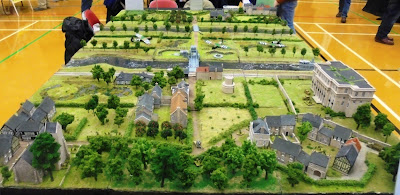I had hoped to have finished decluttering my toy/wargame room by the end of February, but it looks as if I’m going to miss my self-imposed deadline … but not by much because 2024 is a Leap Year and February has an extra day … a bunce day!
I hadn’t heard of the term ‘bunce’ until I started work as a callow (I was a pupil at a single-sex grammar school) and very young (I was fifteen years-old) shop worker at the local branch of J Sainsbury, but soon learned that its slang meant an unexpected bonus. It was the first of many slang words that I learned whilst working in retailing, the others mostly being shop or back slang.
Shop or back slang was developed so that shop workers could converse with one-another in front of customers without the customers knowing or understanding what was being said. For example, feeb meant beef, bemal meant lamb, and rettub meant butter. It was, however, mostly used to talk in insulting terms about the customers. Hence, a troublesome female customer might be referred to as a delow woc … or old cow!
I got the job at Sainsburys by going along every week and asking the manager for a part-time job. Eventually he gave in, and after a period of training at the company’s training school at Stamford Street in central London, I began work handing out baskets to customers as they entered the supermarket.
This was somewhat ironic as the training school was set up to train staff to work in a traditional-style grocers. I learned how to slice cold meat, pat butter into shape, cut cheese with a cheese wire, and make sugar bags from sugar paper … and my local branch was one of their first supermarkets where none of these skills were used!
I soon progressed to become a bag packer (i.e. I packed customer’s bags for them) and then to work in the buffer store. This was where tinned goods and pre-packed goods (e.g. packets of biscuits) were price-stamped before being put out on the shelves and where any surplus was stored. If you worked in the buffer store you spent your time bringing stuff down from the warehouse, pricing it up if it wasn’t pre-priced, and then putting it on the shelves. We had to use spacers between each stack of tins and to ensure that the newest stock was always at the back of the display. We also had to regularly check the shelves to ensure that displays were tidy, and any depleted stocks were restocked promptly.
I stayed in the buffer for about a year before moving on the the dairy section, where my main tasks were stocking and cleaning the pre-cut cold meat, milk, cream, butter, margarine, and egg displays. I stayed there until I left school at the age of eighteen and moved on to full-time work at Coutts and Company, although I was offered the opportunity to become a trainee manager with Sainsburys.
Looking back, working at Sainsburys helped me to grow up and mature. Like every other newly-recruited worker, I was subject to a degree of what would now be regarded as low-level bullying (e.g. being told to go and get some tins of elbow grease from the warehouse) but once I learned to laugh when I was caught out, I was soon accepted by my coworkers.
The final incident was being invited to join the card school in the staff canteen one Saturday lunchtime. The game being played was whist, and the stakes were six pence per game. My coworkers obviously expected me to be an easy touch and I lost the first couple of hands we played. However, playing cards (particularly whist and crib) was something that my father enjoyed and from an early age I’d learned to count cards. By the end of that lunchtime I’d taken five shillings off each of the other players. After that, the bullying stopped … and I was never invited to play cards again!













































































.jpeg)












